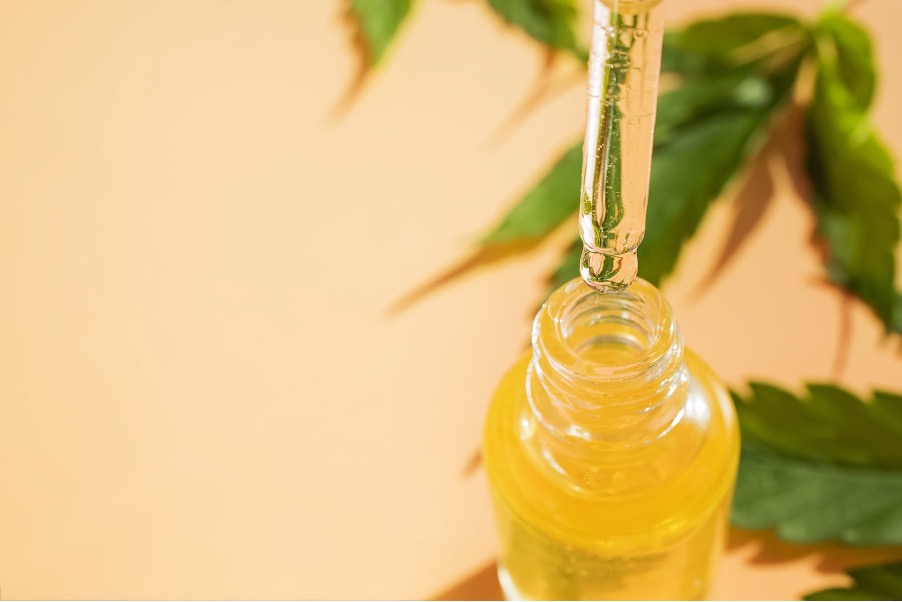CBD has made its way into our corner shops and supermarkets and can be found in health food sections, on skincare counters, and amongst tobacco displays. From protein shakes to sublingual oils and muscle balms to vapes, the options are endless for this natural hemp extract. However, is CBD a short-lived fad, or will we see more products in our shops?
The UK is currently the second biggest consumer of CBD after the US, and we spend more money on it than we do on vitamins B and C together.
What is CBD?
Cannabis contains over a hundred cannabinoids, and cannabidiol (CBD) is one of them. Tetrahydrocannabinol (THC) is another, and the two are often confused. THC is a cannabinoid that has an intoxicating effect, and it is found in high levels in the marijuana strain of cannabis. CBD is not intoxicating or addictive, and it is usually extracted from the hemp strain of cannabis. Full-spectrum CBD products in the UK contain less than 0.2% THC, while broad-spectrum and isolate CBD products undergo extra refinement to ensure they are free from THC.
 Why are there different types of CBD?
Why are there different types of CBD?
Since we all have different health needs, the industry provides a choice of CBD types. Full-spectrum CBD comes with a range of cannabinoids that are believed to work together to produce an entourage effect, enhancing the benefits that each compound provides. Broad-spectrum CBD is the same but lacks traces of THC and yet produces the same effect. Isolate also lacks traces of THC and any other cannabinoids, so it does not produce an entourage effect. Broad-spectrum and Isolate are great options for athletes or anyone who wants to ensure THC will not show up in a drug test.
All humans and even other mammals have an endocannabinoid system (ECS)
What does CBD do?
All humans and even other mammals have an endocannabinoid system (ECS) that produces cannabinoids similar to those found in cannabis. They help to keep the ECS balanced, enabling it to regulate everyday processes like mood, pain, and sleep. Our endocannabinoids and those found in cannabis, like CBD, interact with the receptors of the ECS, giving the system a boost when needed.
Cannabis derivatives have also been found to have broader beneficial qualities for a range of medical conditions including cancer-related nutritional problems.
How do people benefit from CBD?
Some cannabinoids, like THC, have a psychoactive effect, causing euphoria, altered perception, and impaired memory. Others, like CBD, have a calming or energising effect and bring about enhanced focus. Furthermore, CBD is a natural product, which fits in well with the growing demand for plant-based ingredients as well as the trend to move away from manufactured compounds that may pose a risk to health.
Lastly, there is now an array of CBD products available to consumers, making it a versatile and accessible supplement that can be consumed and used in different ways. Gym-goers can buy CBD shakes, making it easy to include CBD in their diet alongside their protein intake. Office workers can enjoy CBD gummies to keep their energy and concentration levels up throughout the day. Those that don’t want to take CBD capsules or swallow pipettes of CBD oil can try CBD edibles - and there are a lot of tasty snacks on the market!
What CBD products are popular?
As mentioned, there are different types of CBD (full-spectrum, broad-spectrum, and isolate), and there are different strengths (from 5mg to 16,000mg). There are also different ways to consume CBD via oils and capsules, food and drinks, or vapes, and there are topicals that can be applied to the skin.
Oils and capsules
CBD oils are typically absorbed under the tongue for quick absorption into the bloodstream since this enables the compound to bypass the digestive system. Onset is rapid (approximately 30 minutes), and the effects last 12-24 hours. CBD capsules are swallowed with water and are popular with people who do not like the earthy taste of cannabidiol. The effects take longer to be felt as the compound must travel through the digestive system first, but they last for about the same length of time.
Food and drinks
CBD edibles and drinks like gummies, cookies, tea, coffee, and sparkling waters provide a delicious way to take CBD. Onset can take up to an hour, and the effects last for 12-24 hours.
Vapes and diffusers
CBD vapes and diffusers don’t usually contain tobacco or nicotine and come in a variety of flavours and aromas. They are the quickest consumable to take effect (a matter of minutes) since they enter the bloodstream via the lungs. The effects wear off quickly, though (within 2-4 hours).
Skincare
CBD skincare products can be used to target particular areas of the body. Examples are muscle balms, facial oils, hand creams, and bath bombs. Their onset can take between 15 minutes and 2 hours, and the effects typically last for at least 5 hours.
What are the forecasted sales for CBD?
Although CBD was isolated as a single compound from cannabis in 1940, it wasn’t until 1963 that its effects became clear when the compound was synthesised in a laboratory. This led to the discovery of the ECS and an understanding of how CBD interacts with our bodies. Fast forward to 2017, and the World Health Organisation reported that CBD does not pose a health risk. In 2019, sales of CBD in the UK were valued at £314 million. Sales rose further during the Covid pandemic, and by 2021, they reached £690 million. The UK is currently the second biggest consumer of CBD after the US, and we spend more money on it than we do on vitamins B and C together. The market is predicted to grow to £1 billion by 2025.
The takeaway message
CBD products have become commonplace in our shops and can easily be bought online. There are a lot of different forms to choose from, allowing users to find something to suit any need. CBD benefits health through the ECS, bringing balance when it is lacking and inducing calm, energy, and focus. This natural compound has made a massive impact on the market and is likely to continue to do so for the foreseeable future.





